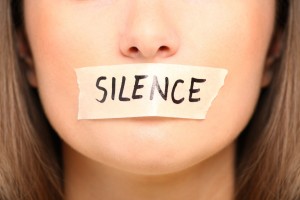Let’s Talk about the Suppression of Women’s Speech
 Image by macniak / 123RF
Image by macniak / 123RF I am an extremely extroverted and talkative person. While I have sometimes been complimented for my outgoing personality, I have always been extremely self-conscious of my “chatty ways.” I always find myself apologizing for verbally expressing my opinions and chiming in on conversations. Until this past weekend, I never realized how much masculinized speech norms have taken away my freedom of expression.
On Friday, I attended the Women in Secularism III conference held in Alexandria, VA, which included a session titled, “Gender and Free Expression.” The presenter was Soraya Chemaly, a feminist writer, media critic, and activist whose work focuses on women’s rights and the role of gender in politics, religion, and popular culture. I left the session feeling speechless, but in an empowered way.
Chemaly’s presentation illustrated the many ways women’s speech is suppressed and how this suppression begins at a very young age. Girls are taught and socialized to not only “carefully regulate” their speech but that what they say isn’t as important as what a boy has to say. Girls are taught to always be polite and that “quiet behavior is expected.” Therefore, girls and women who often express their opinions with confidence are seen as aggressive and dominant, and they’re not respected.
Gendered speech norms and the suppression of women’s speech are extremely pervasive in the media. Women are depicted as objects in television shows, music videos, and advertisements. Autonomy is a component of free speech. Objectification removes a woman’s autonomy over her body and therefore silences her.
Likewise, having to keep quiet about sexual harassment or unwanted sexual attention for fear of further harm is a suppression of speech. Chemaly was instrumental in lobbying Facebook to recognize misogynistic content as hate speech, and presented some shocking examples of images of physically abused women that had been posted under the “humor” tag with captions like, “Women deserve rights…and lefts” (in that case a man’s clenched fist was visible in the foreground). Speaking of threats made to women online and how they inhibit speech, Chemaly made the chilling observation that those making the threats often used language focusing on the neck (strangling, hanging, forced fellatio, and so on).
Books are another medium through which women’s speech is suppressed. The majority of protagonists in children’s books are male and, Chemaly writes, “in popular children’s books featuring animated animals, 100% of them have male characters, but only 33% have female characters.” Where do we go from here? How do we challenge what is so engrained in our culture?
Chemaly also briefly touched on the prevalence of patriarchy and the ritual of silencing women in most major religions. In other words, women are expected to obey the men in their lives and are not allowed to have their own thoughts and feelings. By not allowing women to become priests, for example, the Catholic Church teaches women that they aren’t “good enough” and therefore should never be in a position of authority.
This presentation truly opened my eyes to the link between gender and freedom of speech and freedom of expression. It is absolutely terrifying how much women are being silenced and objectified. I feel as though we as a community not only have a duty to educate others about the suppression of women’s speech but to take positive action so that women’s opinions are respected and heard.
